For more than 30 years now I have walked past the Goldsmiths’ memorial to those students and staff killed in the First and Second World Wars of the 20th century and have been finding out about the lives these names and initials represent.
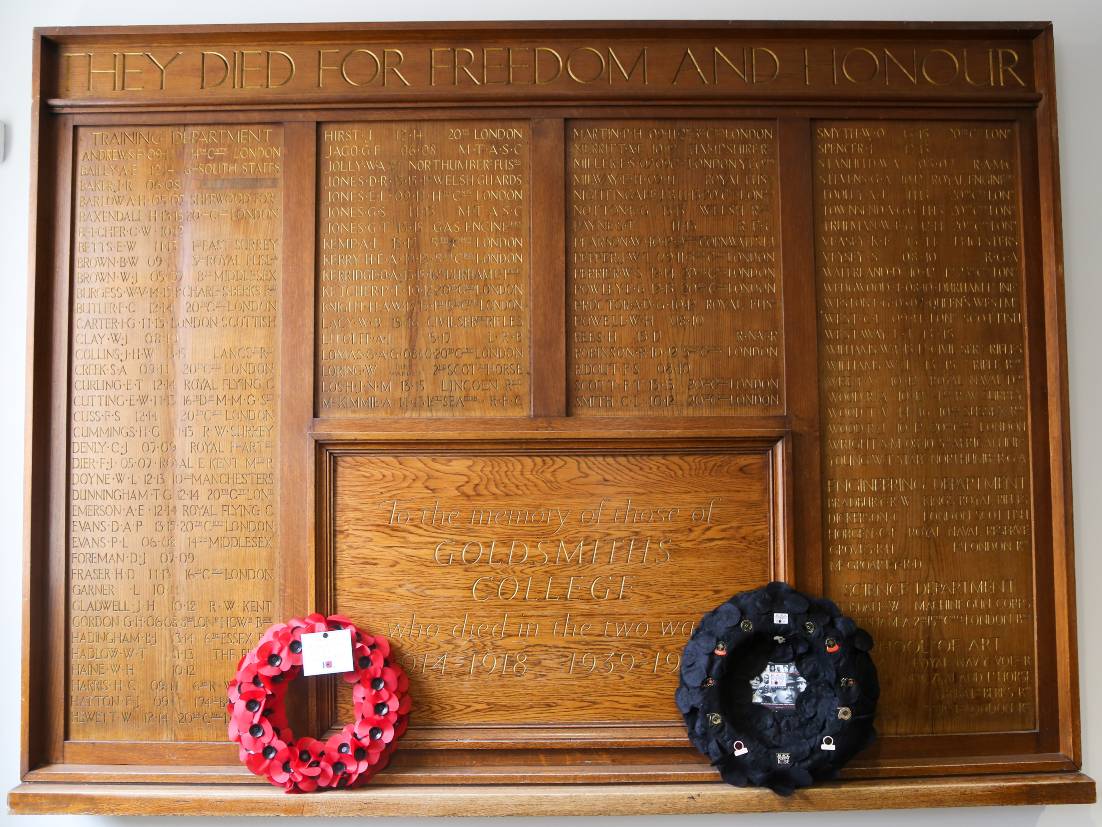
Goldsmiths memorial to alumni (staff and students) who died while in service during the First and Second World Wars. Image: Goldsmiths, University of London
Their achievements and sacrifices are truly humbling.
Their loss left grieving and unutterable sadness.
The sound of the crack of a hockey stick against ball whenever the game is played on what is now the College Green bordered by the Professor Stuart Hall, Ian Gulland and Richard Hoggart main buildings summons up the memory of one of them.
He was Percy Thomas Rothwell and would go on to play Hockey for England.
When he was a student teacher at Goldsmiths between 1931 and 1933 he was known as ‘Jinks’ and while there he fell in love with fellow student teacher Dorothy Ellen Lord who was known by her nickname ‘Bill.’
‘Bill’ and ‘Jinks’ were at the College when the Great Depression hit hard.
Teachers and university lecturers had to take a reduction in their salaries.
Student teachers quite rightly feared if there would be any jobs for them when they qualified.
Both would serve in the terrible war that followed.
Dorothy as ‘Bill’ the driver-instructor in the ATS (Auxiliary Transport Service) in which the late Queen Elizabeth II was commissioned as an officer.
But Dorothy’s husband ‘Jinks’ would not return like 383,700 service personnel in the British armed forces killed between 1939 and 1945. And as we also know around 67,200 civilians would be killed on the Home Front.
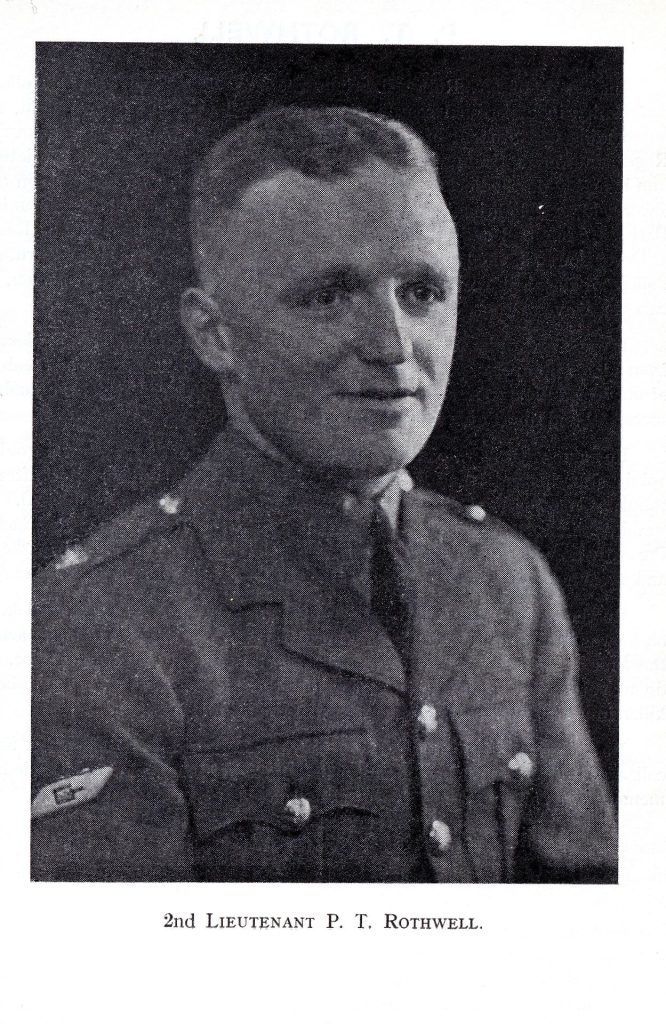
Portrait of Goldsmiths student and staff alumnus, Percy Rothwell while in uniform during the Second World War. Image: Goldsmiths, University of London Special Collections. Portrait in Smith Magazine 1941.
That was .94 per cent of the country’s adult population in 1939.
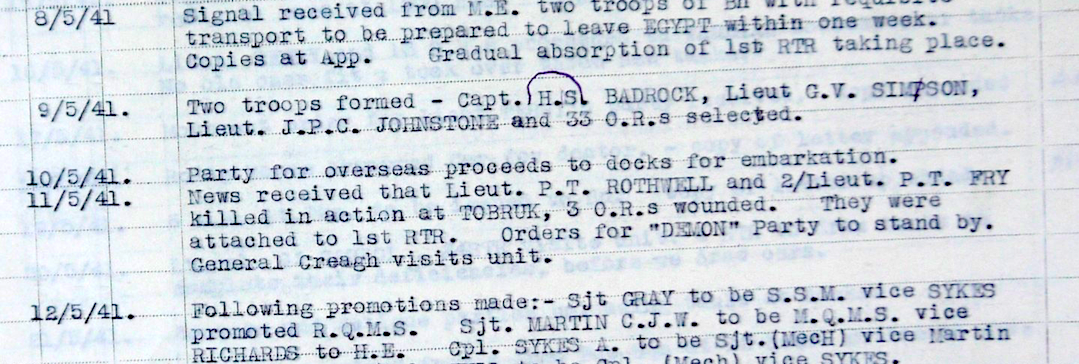
Entry in War Diary for May 1941 7th Royal Tank Regiment, R.A.C. National Archives. See: https://discovery.nationalarchives.gov.uk/details/r/C1002224
Percy Thomas ‘Jinks” Rothwell was the second son born to Fred and Alice Rothwell on 11th January 1913 when they were running the Swan Hotel Inn at 42 Queen Street, Deal, Kent which at that time was a very old perhaps 17th or 18th century building.
The Dover Kent Archives website developed by Paul Skelton has a postcard produced by the Rothwells and dated 1908- the year after Fred took on the licence.
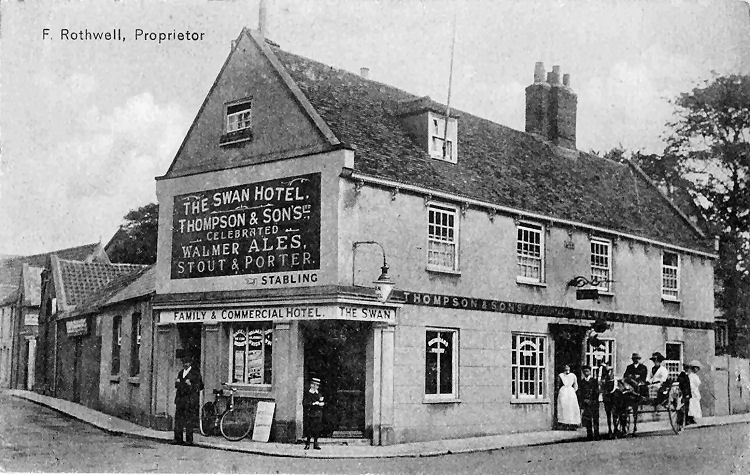
It is an Edwardian scene with a bicycle leaning outside the frontage and signage advertising a “family and commercial hotel, Thompson and sons Ltd, celebrated Walmer ales stout and porter and stabling.”
Down the side a well-dressed couple are sitting in a pony trap while a house-maid stands in a doorway.
Another undated picture shows nearly 50 men gathering for a group picture in front of the Swan- all in early 20th century suits and work-clothes, flat caps, bowlers and trilbies- some smoking pipes, others with waistcoats and watch-chains.
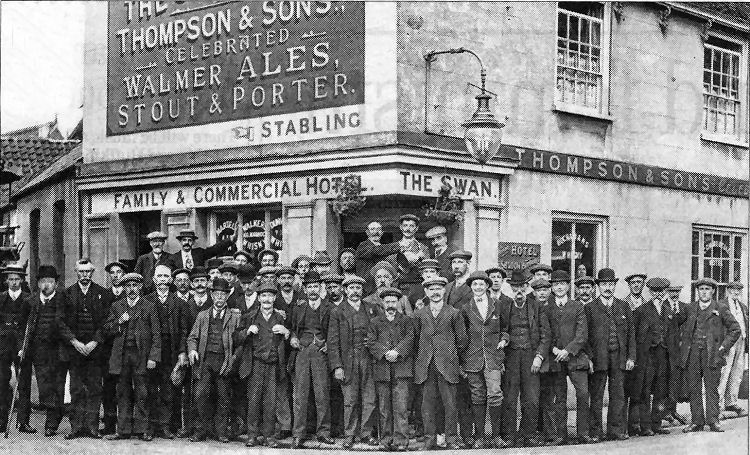
After the Rothwells retired in 1937 the original building would be demolished and rebuilt in the modern style.
This was in the heart of Kent’s mining region with the nearby Betteshanger, Chislet, Snowdown and Tilmanstone collieries all connected by their own railway line- the East Kent Light Railway.
Percy’s older brother Henry Joseph was born two years before.
Henry would also serve with distinction in the British Army during WW2 as a staff officer in the 59th Division which stormed the Normandy beaches on 6th June 1944.
He was one of the senior British Army officers in General Eisenhower’s Supreme Headquarters Allied Expeditionary Force (SHAEF) and would be awarded a military MBE.
Percy was a second lieutenant in tanks and fought with the British Expeditionary Force’s courageous attempt to break the German invasion sweeping across France at Arras in May 1940.
They would be repulsed by a Wehrmacht division and artillery commanded by General Erwin Rommel.
Percy survived evacuation from Dunkirk though his regiment had to abandon and destroy all their tanks, arms and equipment.
After refitting in England, his 7th Royal Tank Regiment with the new Matilda Mark II tank would be sent to Egypt where in a dramatic advance across Libya in late 1940 and early 1941, they captured Tobruk and would have succeeded in driving all Axis Forces into the Mediterranean Sea had many of their forces not been depleted to go to the ill-fated aid and defence of Greece.
THE BRITISH ARMY IN NORTH AFRICA 1941 © IWM (E 2863)
Captain Keating wrote on the back of the photograph above: ‘Tobruk, although beseiged by the enemy is by no means inactive. The Garrison is busily engaged in preparing defences, repelling enemy attacks, and is fairly humming with activity. These give one a peep behind the scenes, and illustrate many of the activities of the beleagured fortress in the desert.’
Percy was recommended for the Military Cross in January 1941 and would be mentioned in dispatches.
He would be killed defending Tobruk on 4th May 1941- when besieged by the growing nemesis of British armed forces, General Rommel again- this time with his newly formed German Afrika Corps.
Percy went to Sir Roger Manwood’s Grammar School in Sandwich where he won the Victor Ludorum in two successive years and in 1929 he played for the Kent Schools cricket team at the Oval. He was a good all round sportsman playing soccer, rugby, appearing for Deal Town Club’s cricket team whenever at home and shone in Manwood School’s Officer Training Corps where he gained the rank of sergeant.
But hockey was the game he excelled in and his success in the Goldsmiths’ College team brought him to the notice of England selectors as a major talent to follow and take an interest in.
He would play for England in four international games in 1938 and also played in the British Isles team in Germany and appeared on several occasions for the South of England team up until 1940.
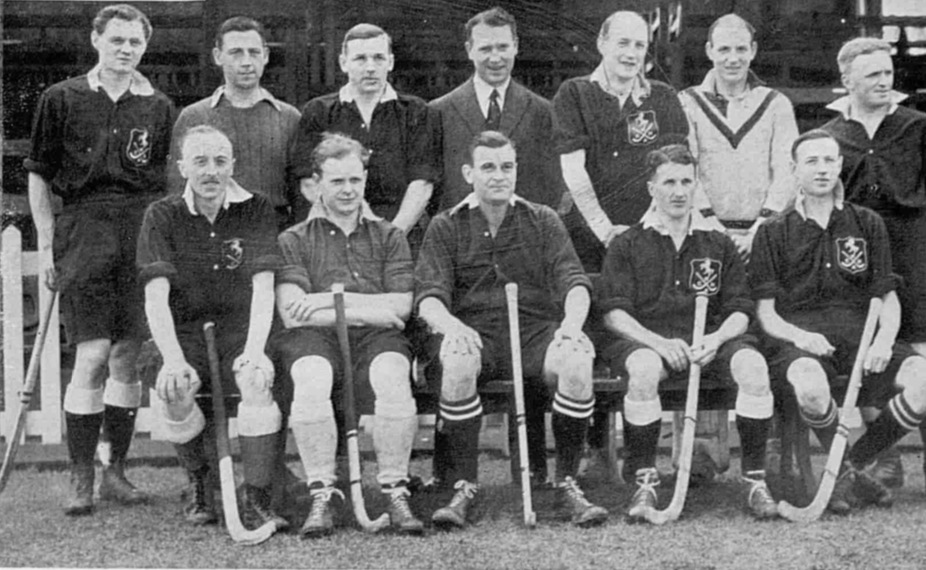
Percy Rothwell playing for Kent Eleven in March 1940. Seated second from the right. From ‘Grand Finish To Hockey.’ The Illustrated Sporting and Dramatic News 29th March 1940.
He was 18 when he began the two year teaching certificate training course at Goldsmiths on 22nd September 1931, staying at the Aberdeen Terrace Hostel in Blackheath.
In 1933 he would do an extra year at Leeds Specialist Carnegie Physical Training College in order to achieve a further qualification to teach PE in British secondary schools.
At Goldsmiths he was remembered as an ‘outstanding’ student. When news of his death at the untimely age of 28 came to his colleagues in 1941, they wrote: ‘Some of us can still picture him in action on the hockey field at New Cross, or smiting the bowling on the lower field, or delighting us on the high diving board in the College Swimming Bath.’
As he was grant funded by Kent County Council, it was understandable he would teach at Dover County School and other schools across the county before being recruited by Goldsmiths’ in 1937 to take charge of a new Third Year Course of Physical Training for men.
Goldsmiths was so proud that one of its own alumni and lecturers would turn out for England in international hockey.
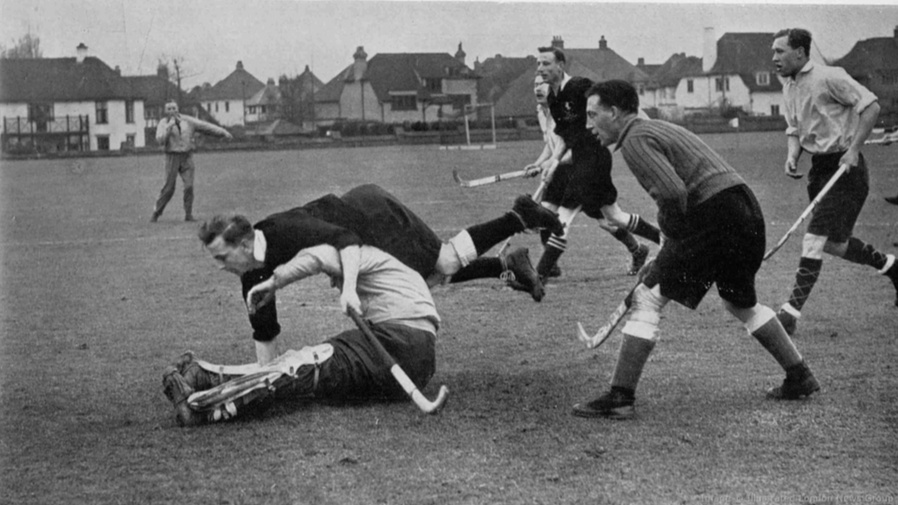
Percy Rothwell’s Kent Eleven in action against an International Eleven and scoring an equalizer in March 1941. From ‘Grand Finish To Hockey’ The Illustrated Sporting and Dramatic News 29th March 1940.
Romance blossomed between Percy Rothwell and Dorothy Lord at New Cross. They were the same age and started teacher training together. Dorothy hailed from Narborough in the Midlands.
After qualifying in the summer of 1933 she went to teach in state elementary schools run by Leicester’s Education Committee. Her father managed a workshop manufacturing stone casts.
Her sister Angela was also a teacher, in the same way Percy’s brother Henry was a schoolmaster in Folkestone.
Their social world at Goldsmiths in the early 1930s was different from what it is now.
Students had access to men’s and women’s Common Rooms.
They dined separately in the College refectory at timetabled ‘sittings.’
An art student at the time illustrated their world by caricature.
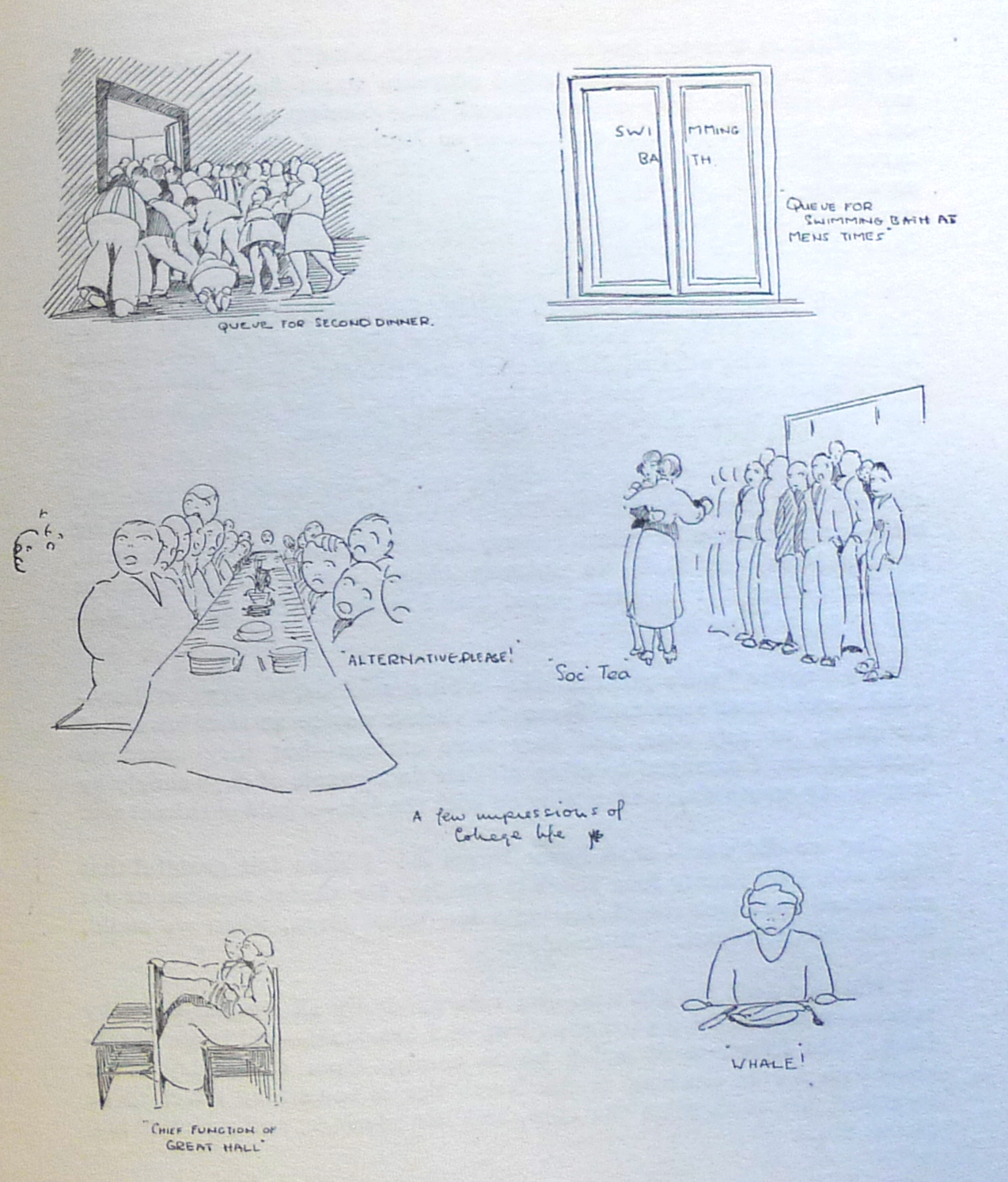
Witty sketches of life for students at Goldsmiths College in 1933 for Smith Magazine of that year. Image: Goldsmiths, University of London Special Collections.
Unseemly queues for lunch and a scrum to get in when the doors opened.
Tea dances on Friday afternoons were the popular occasions for meeting up.
Surreptitious shows of affection would go unnoticed during big lectures in the Great Hall.
Lecturers would wear gowns.
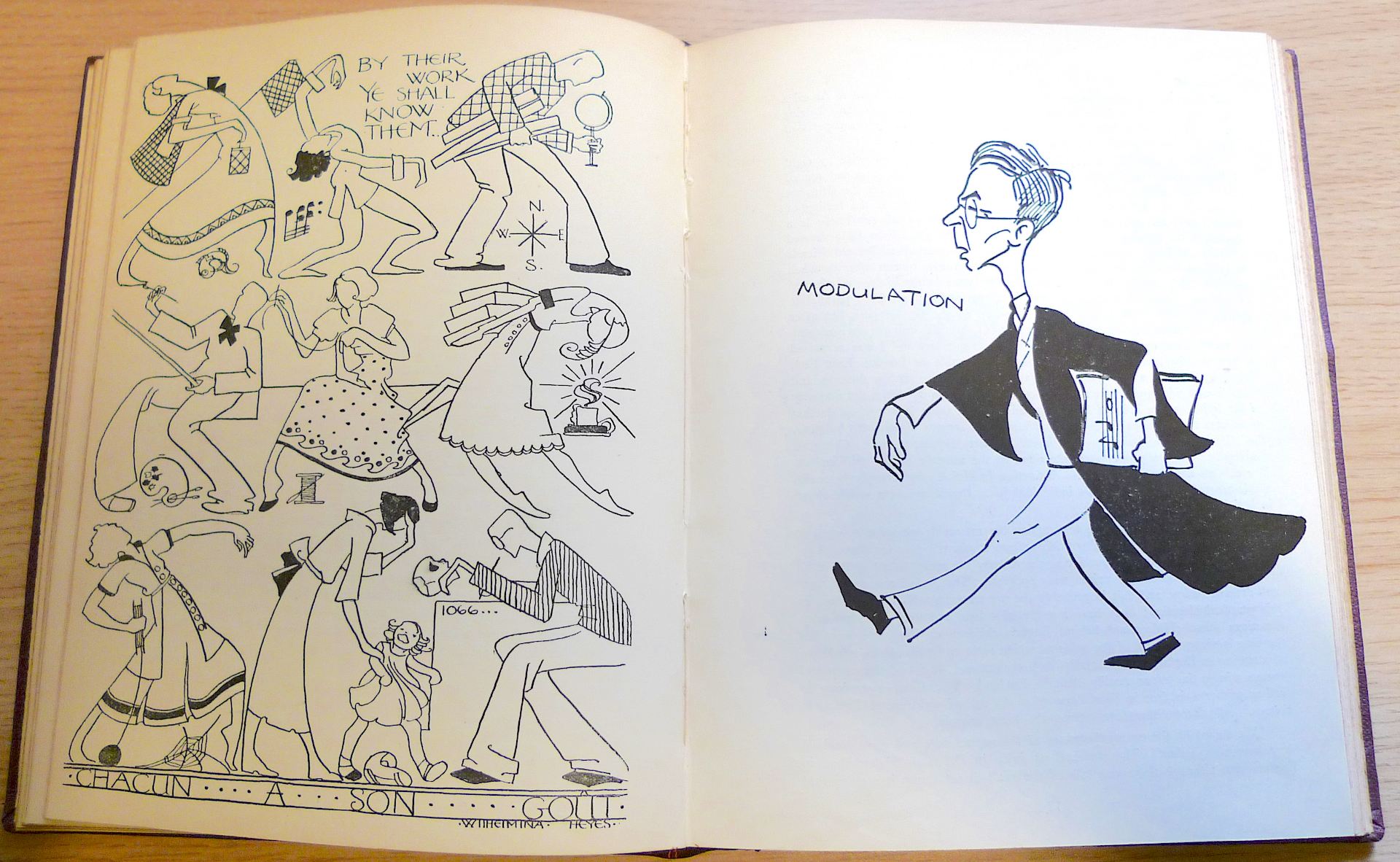
Witty caricatures by Goldsmiths’s student for the Smith Magazine in 1933. Image: Goldsmiths, University of London Special Collections.
The couple married in Narborough in July 1937.
But Percy and his brother Henry were highly regarded members of the officer’s OTC reserve.
In the autumn of 1939, Percy had gone with the College’s evacuation to Nottingham University College and was boarding with his history lecturer colleague Edwin Ridout at Beeston.
Two months later he would be commissioned in the Royal Tank Regiment.
The College said he had ‘won golden opinions for his quiet and modest efficiency and dependability.’
Such leadership transferred to the battlefield in Flanders.
The college record says he ‘went through the hell of Dunkirk unscathed; and… he came to see us again, and told us a little of his experiences. He then went out to Egypt with his regiment, after refitting, and later on he was in the front line of the great advance across Libya, and was part of the force that took Benghazi.’
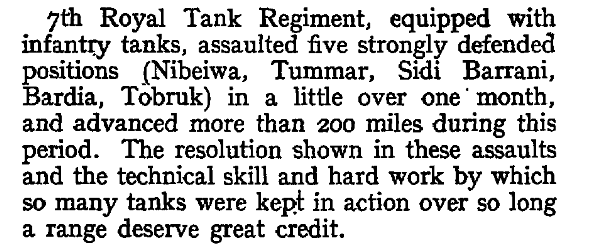
British Gazette commendation to 7th Royal Tank Regiment in against and defeat of Italian troops in 1941.
Those who served and lived during Second World War are becoming fewer as the generations pass away.
Whenever you hear the crack of hockey stick to ball on the College Green or indeed pass the memorial at Goldsmiths’ main building entrance, do remember Percy otherwise known as ‘Jinks’ and his beloved Dorothy otherwise known as ‘Bill’ who met and fell in love at Goldsmiths.
They both served, but as it has often been said, one of them made the ultimate sacrifice.
Many thanks to the brilliant team in Goldsmiths’ Special Collections Lesley Ruthven and Dr. Alexander du Toit for all their assistance and support with archives.
That’s So Goldsmiths– the history of Goldsmiths, University of London by Professor Tim Crook coming soon.
